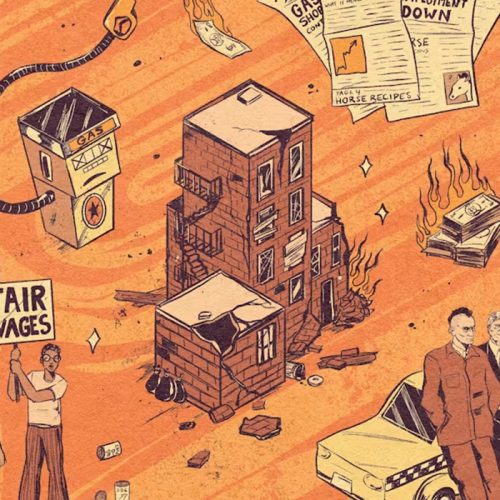We’ll leave other pundits and analysts to guess at the “why” behind the almighty Black Monday slump in Tokyo ( how about higher interest rates and a soaring Yen)…
But for the broader sense of an ending in the long boom for US equities, try the words “Warren Buffett”.
Data published last weekend said the ancient Sage of Omaha slashed his holdings of over-priced gadget-brand Apple in half between April and June, taking profit at new record highs in AAPL as part of a $76 billion switch from stocks to cash, now at a record-high level for the Berkshire Hathaway money he runs.
Buffett and his team clearly think they know something. And in a proper financial crash, “All correlations go to 1” as old-time traders like to put it…
…meaning that when trouble really hits the fan, everything slides together.
Most times, that includes gold.
Time to panic?
“Gold is behaving exactly as it should,” said bullion-market specialist Rhona O’Connell, now at brokerage StoneX amid Monday’s stock sell-off.
“[This is] normal…There has been liquidation in the face of equities weakness.
“Clients often ask why this happens, given that gold is supposed to be an insurance policy.
“The answer is that it’s doing exactly what it should and providing comfort in times of trial, but then recovering.”
Put another way, global stocks on Monday lost more than 5% from the same point last month on the MSCI World Index. Gold, in contrast, continued to show a 2% gain at the start of London trade.
So when leveraged traders checking their phones at breakfast (whether at home or on the beach) saw margin calls pouring in from their brokers ahead of the New York opening, it forced them to liquidate winning positions to cover their losses elsewhere.
This isn’t unusual. Indeed, it’s how most equity crashes have played out historically.
Oh sure, gold jumped on Black Monday 1987, adding 3.2% as New York’s Dow Jones index sank by more than 1/5th in one session.
But that gain, like that equity plunge, was pretty unique.
The more common pattern in a stock-market crash is for gold to drop as equities sink. But it falls less and from higher ground before finding its floor sooner.
No promises of course. But that’s exactly how Black-and-Blue Monday ’24 has played out so far.
Take the collapse of Lehman Brothers in September 2008 for instance. Gold gained 10% that week. But the loss of a major investment bank…
…taking with it pretty much all credit and leverage in financial markets everywhere…
…then saw gold sink by more than 20% over the following 4 weeks as US equities dropped by 22%.
“That’s it, gold doesn’t work!” shouted some pundits.
“Clearly gold is being suppressed!” shouted others.
But no. Gold did exactly what short-term traders needed it to do…
…offering a deep and liquid market in which to raise urgent cash.
More importantly, gold did exactly what investors would want it to do to, if only they took a breath (and a Valium)…
…rising across the longer-term to offset the grinding long-term losses in the stock market.











